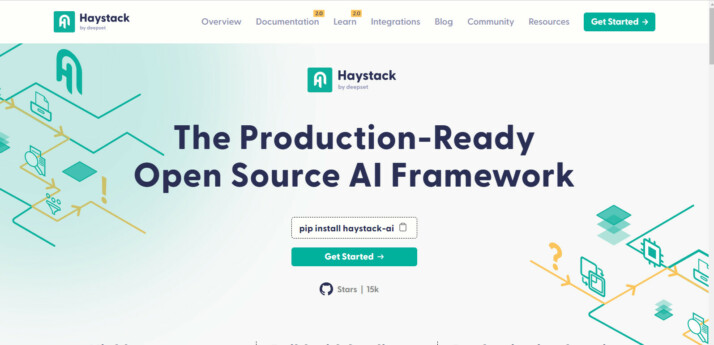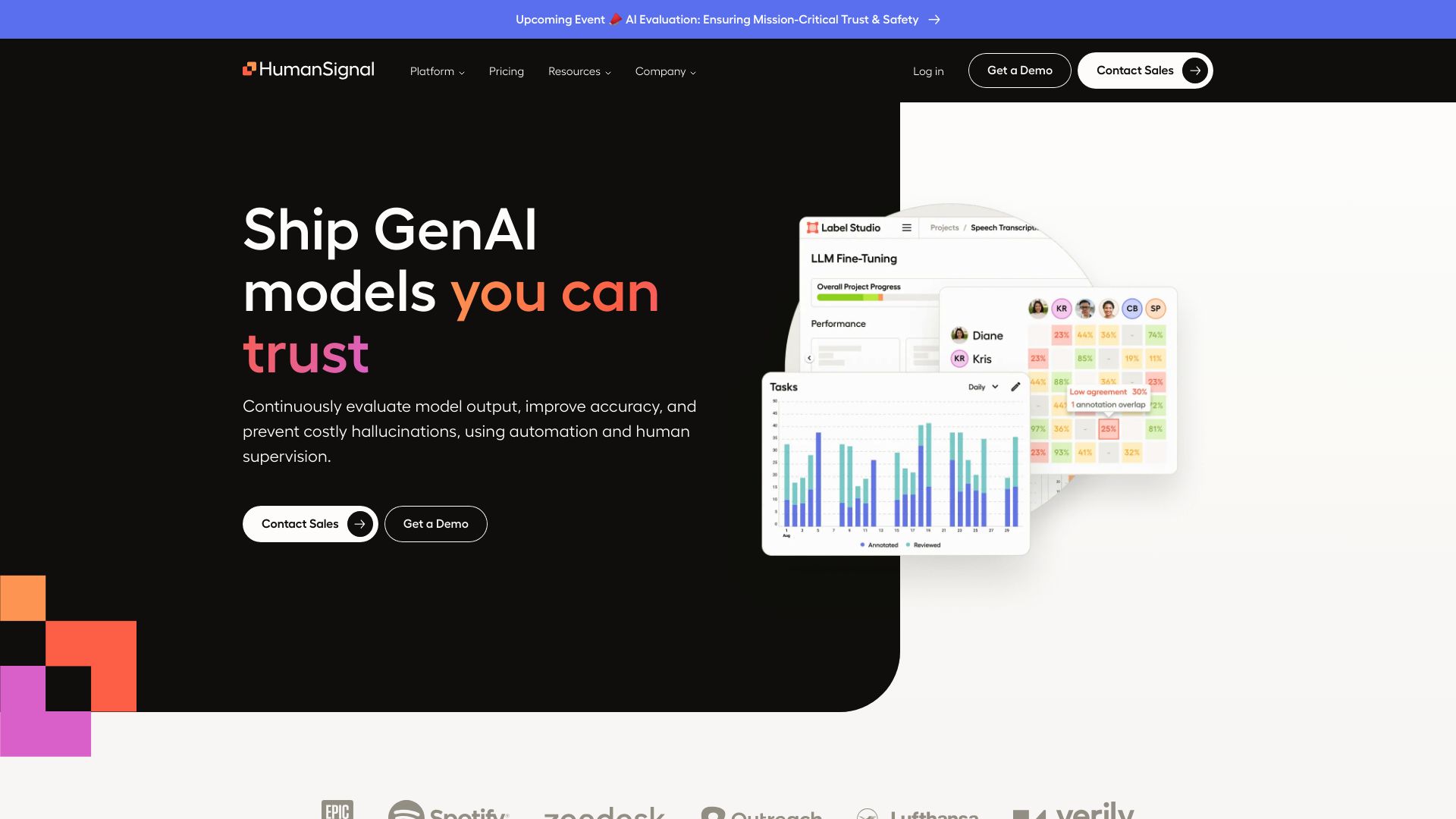Haystack vs. Adala: Comparing AI Agent Development Platforms
AI agent development platforms reshape how businesses harness artificial intelligence. Haystack vs. Adala offer powerful solutions for specific AI needs, but SmythOS delivers unmatched versatility and accessibility. This comparison explores how each platform tackles AI challenges, from natural language processing to data labeling.
We’ll examine their strengths, limitations, and unique features to help you choose the best tool for your AI ambitions. Whether you’re a seasoned developer or new to AI, our analysis provides insights to guide your decision-making process.
Haystack Overview
Haystack empowers developers to create sophisticated AI-driven applications using Large Language Models (LLMs) and vector search technology. This open-source framework excels in retrieval-augmented generation, document search, and question answering tasks. Haystack’s modular architecture allows developers to construct custom pipelines, integrating tools like Hugging Face Transformers, Elasticsearch, and OpenAI.


Haystack shines in natural language processing (NLP) tasks, offering a comprehensive toolkit for building production-ready applications. Its flexible components enable the creation of tailored search experiences and conversational chatbots. Haystack’s strength lies in its ability to combine powerful language models with efficient retrieval mechanisms, making it ideal for organizations dealing with large volumes of unstructured data.
Haystack’s strength lies in its ability to combine powerful language models with efficient retrieval mechanisms, making it ideal for organizations dealing with large volumes of unstructured data.
The framework supports a wide range of use cases, from simple question-answering systems to complex multi-agent setups capable of reasoning and problem-solving. Haystack’s integration with popular AI models and its support for multimodal content retrieval make it a versatile choice for developers tackling diverse NLP challenges.
While Haystack offers extensive capabilities, it requires a certain level of technical expertise to fully leverage its potential. The framework’s code-centric approach may present a steeper learning curve for users seeking no-code solutions. Additionally, as an open-source project, some enterprise-grade features like advanced security controls or specialized deployment options might require additional configuration or third-party integrations.
Haystack’s ecosystem extends beyond the core framework. The deepset Cloud platform complements Haystack by providing a managed environment for the entire lifecycle of NLP application development. This combination offers a powerful solution for teams looking to rapidly prototype, deploy, and scale their AI-driven applications while maintaining control over their infrastructure and data.
Adala Overview
Adala revolutionizes data labeling with its open-source framework for autonomous agents. This innovative platform empowers data scientists to create AI agents that learn and improve through interactions with ground truth datasets, evolving into efficient prediction engines for large-scale data labeling tasks.
Adala revolutionizes data labeling with its open-source framework for autonomous agents… empowers data scientists to create AI agents that learn and improve through interactions with ground truth datasets


Adala’s strength lies in its ability to automate complex labeling processes, reducing manual effort and improving accuracy over time. The platform supports various data types, including text, images, and video, making it versatile for diverse machine learning projects. Integration with popular machine learning models enables continuous active learning, enhancing prediction quality with each iteration.
Adala’s strength lies in its ability to automate complex labeling processes, reducing manual effort and improving accuracy over time.
Developed by HumanSignal (formerly Heartex), Adala builds on the success of Label Studio, a widely-used open-source data labeling tool. This heritage ensures robust community support and ongoing development. However, Adala’s focus on autonomous agents sets it apart, offering a unique approach to data-centric AI development.
While Adala excels in automating data labeling, it may have limitations for users seeking a comprehensive AI agent development platform. The tool’s specialized nature means it may not offer the breadth of features found in more general-purpose AI builders. Additionally, users might face a steeper learning curve when adapting Adala for tasks beyond its core data labeling focus.
Adala’s open-source nature fosters collaboration and customization, allowing organizations to tailor the platform to their specific needs. This flexibility, combined with HumanSignal’s commitment to democratizing data-centric AI, positions Adala as a valuable tool for data scientists and AI researchers aiming to enhance their data labeling processes and improve model performance.
Feature Comparison
Haystack and Adala offer distinct approaches to AI agent development, each with its own strengths and limitations. Haystack provides a comprehensive framework for building production-ready NLP applications, while Adala focuses on autonomous data labeling agents.
Haystack excels in its flexibility and integration capabilities. It supports a wide range of AI models, including those from Hugging Face, and offers extensive API integrations. This allows developers to create sophisticated pipelines for tasks like question answering and document search. However, Haystack lacks a visual builder or no-code editor, requiring users to have coding experience.
Adala, on the other hand, specializes in automating data labeling processes. Its strength lies in creating agents that learn and improve through interactions with ground truth datasets. While this makes Adala highly effective for data labeling tasks, it may not offer the breadth of features found in more general-purpose AI builders like Haystack.
Both platforms support autonomous agents and multi-agent collaboration, but their implementations differ. Haystack’s agents can use various tools to resolve complex queries, while Adala’s agents focus on evolving into efficient prediction engines for data labeling. This distinction highlights the platforms’ different target use cases and architectural approaches.
In terms of security and deployment options, Haystack seems to offer more robust features. It supports OAuth authentication and API deployment, whereas Adala’s documentation doesn’t explicitly mention these capabilities. However, Adala’s specialized nature may provide unique advantages in data-centric AI development that Haystack doesn’t address.
We offer a more comprehensive solution that combines the strengths of both platforms while addressing their limitations. Our visual builder and no-code options make AI agent development accessible to a wider audience, while still providing the flexibility and integration capabilities that advanced users require. Additionally, our platform includes features like an agent work scheduler and extensive logs and monitoring, which are not explicitly mentioned in either Haystack or Adala’s feature sets.
Feature Comparison Table
| Haystack | Adala | SmythOS | |
|---|---|---|---|
| CORE FEATURES | |||
| Visual Builder | ❌ | ❌ | ✅ |
| No-Code Options | ❌ | ❌ | ✅ |
| Audit Logs for Analytics | ✅ | ❌ | ✅ |
| Agent Work Scheduler | ❌ | ✅ | ✅ |
| SECURITY | |||
| Constrained Alignment | ❌ | ✅ | ✅ |
| IP Control | ❌ | ❌ | ✅ |
| COMPONENTS | |||
| Zapier APIs | ❌ | ✅ | ✅ |
| Data Lakes | ❌ | ❌ | ✅ |
| DEPLOYMENT OPTIONS (EMBODIMENTS) | |||
| Staging Domains | ❌ | ❌ | ✅ |
| Production Domains | ❌ | ❌ | ✅ |
| Deploy as Scheduled Agent | ❌ | ❌ | ✅ |
| DATA LAKE SUPPORT | |||
| Sitemap Crawler | ❌ | ❌ | ✅ |
| YouTube Transcript Crawler | ❌ | ❌ | ✅ |
Best Alternative to Haystack and Adala
SmythOS emerges as the premier alternative to Haystack and Adala, offering a comprehensive agentic AI automation platform that surpasses both in functionality and ease of use. We combine the strengths of specialized frameworks with a user-friendly approach, making advanced AI agent development accessible to a wider audience.
Our platform excels in its intuitive visual builder and no-code options, features notably absent in both Haystack and Adala. This empowers users of all technical backgrounds to create sophisticated AI agents without extensive coding knowledge. SmythOS also boasts a rich set of pre-built API integrations and templates, streamlining the development process and reducing time-to-deployment significantly.
SmythOS emerges as the premier alternative to Haystack and Adala, offering a comprehensive agentic AI automation platform that surpasses both in functionality and ease of use.
Unlike Haystack’s focus on NLP applications or Adala’s specialization in data labeling, SmythOS offers unparalleled versatility. Our platform supports a vast array of use cases, from chatbots and document processing to complex multi-agent systems. This flexibility allows businesses to adapt AI solutions to their specific needs without the limitations imposed by more specialized frameworks.
SmythOS stands out with its robust security features and deployment options. We provide OAuth authentication, IP control, and various deployment configurations including staging and production domains. These enterprise-grade features ensure that AI agents built on our platform can be seamlessly integrated into existing business processes while maintaining the highest standards of security and scalability.
By choosing SmythOS, users gain access to cutting-edge features like an agent work scheduler, extensive logs and monitoring, and support for data lakes. These capabilities, combined with our commitment to user experience and continuous innovation, make SmythOS the superior choice for businesses and developers looking to harness the full power of AI automation.
Conclusion
Haystack and Adala offer powerful solutions for specific AI development needs, but SmythOS emerges as the superior choice for comprehensive AI agent creation and deployment. Haystack excels in NLP tasks and retrieval-augmented generation, while Adala specializes in autonomous data labeling. However, both platforms require significant technical expertise and lack the user-friendly interface that SmythOS provides.
SmythOS combines the strengths of both platforms while addressing their limitations. Our drag-and-drop interface and no-code options make AI agent development accessible to a wider audience, from technical teams to business users. We offer unparalleled flexibility with over 300,000 integrations, supporting a vast array of AI models, APIs, and data sources.
Unlike Haystack and Adala, SmythOS provides a true “Create Once, Deploy Anywhere” approach. Our agents can be seamlessly deployed across various platforms, from chatbots and APIs to scheduled tasks and GPT-powered applications. This versatility, combined with our robust security features and scalable infrastructure, makes SmythOS ideal for businesses of all sizes.
To experience the future of AI agent development, create a free SmythOS account. Our platform offers unlimited agent creation with a generous free tier, allowing you to explore AI automation without risk. For those ready to revolutionize their workflows, discover our diverse range of AI-powered agent templates and start building intelligent solutions today.
Last updated:
Disclaimer: The information presented in this article is for general informational purposes only and is provided as is. While we strive to keep the content up-to-date and accurate, we make no representations or warranties of any kind, express or implied, about the completeness, accuracy, reliability, suitability, or availability of the information contained in this article.
Any reliance you place on such information is strictly at your own risk. We reserve the right to make additions, deletions, or modifications to the contents of this article at any time without prior notice.
In no event will we be liable for any loss or damage including without limitation, indirect or consequential loss or damage, or any loss or damage whatsoever arising from loss of data, profits, or any other loss not specified herein arising out of, or in connection with, the use of this article.
Despite our best efforts, this article may contain oversights, errors, or omissions. If you notice any inaccuracies or have concerns about the content, please report them through our content feedback form. Your input helps us maintain the quality and reliability of our information.
